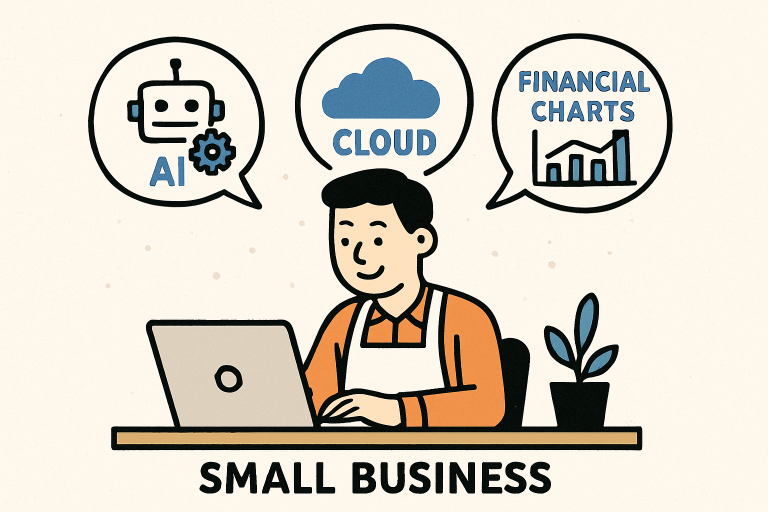Key Takeaways:
- Artificial Intelligence (AI) revolutionizes small business accounting by automating routine tasks and providing real-time financial insights.
- Despite the benefits, many small and mid-sized enterprises (SMEs) face challenges in adopting basic digital tools essential for effective AI integration.
- Accountants are evolving into strategic advisors, guiding businesses through digital transformation and financial planning.
- Ethical AI usage and robust data security measures are critical as businesses rely on AI-driven accounting solutions.
Introduction
Small and mid-sized enterprises (SMEs) are experiencing a profound shift as Artificial Intelligence (AI) becomes integral to modern accounting. Businesses that once depended on manual processes are discovering that AI-driven solutions can transform day-to-day operations, reduce mistakes, and enhance financial visibility. Unsurprisingly, many SMEs now partner with digital-first firms to accelerate AI adoption; working with an accountant who understands modern technologies is more valuable than ever.
Customers, regulators, and competitors are also pressing SMEs to modernize, as they expect efficient financial management and up-to-date reporting. By leveraging AI, SMEs gain access to advanced analytics, predictive insights, and streamlined tax compliance—all factors that drive competitiveness. However, before jumping into advanced automation, many business owners must address their basic digital infrastructure gaps.
The Rise of AI in Accounting
AI has begun to revolutionize accounting by automating repetitive and time-consuming tasks. Data entry, invoice processing, expense categorization, and reconciliation are now handled by intelligent algorithms that reduce human error and ensure accuracy. These platforms can analyze thousands of transactions in seconds, giving business owners real-time dashboards and cash flow projections, leading to smarter financial decisions.
Beyond automation, AI tools are used for fraud detection, forecasting, and even natural language processing—automatically interpreting receipts or email invoices. Many cloud-based solutions now offer built-in AI features, making it easier for SMEs to benefit from automation regardless of size.
While AI is increasingly common, its effectiveness depends on having a robust foundation of digital processes. This includes cloud bookkeeping, secure document management, and digital communication platforms—without these, even the most sophisticated AI tools cannot deliver their full potential.

Recent research by Reuters found that although 46% of SMEs use some AI tools daily, far fewer have digitized their basic operations. This highlights a significant digital gap that needs to be addressed for AI to truly transform the accounting function. For those needing specialized support, dedicated accounting services are an effective solution for bridging knowledge and technology gaps during this transition. Investing in professional accounting services helps implement AI effectively, ensures compliance, optimizes workflows, and provides strategic insights that drive business growth.
Challenges in Digital Adoption
Many SMEs encounter obstacles when embracing modern accounting solutions. These challenges include reluctance to abandon traditional processes, uncertainty around data privacy, and concerns about upskilling existing staff. Small businesses often lack the internal IT resources to implement new systems independently, making professional guidance crucial.
According to The Wall Street Journal, resistance to digital adoption is often rooted in fear of job displacement and the perceived complexity of new tools. However, these barriers can be overcome with clear communication, ongoing training, and the reassurance that AI is designed to augment—not replace—human expertise.
The Evolving Role of Accountants
As automation takes over data-driven accounting functions, industry professionals are transforming into strategic partners for businesses. Accountants now focus on interpreting insights, scenario planning, financial forecasting, and risk mitigation. They help business leaders identify which digital tools to prioritize, customize AI adoption strategies, and ensure companies remain compliant in an ever-changing regulatory landscape.
This evolution is driving a new era of lifelong learning in accounting. Accountants skilled in finance and technology are better positioned to support SMEs with digital transformations and long-term financial planning. According to Forbes, ongoing professional development and upskilling are essential to thrive in this new reality.
Ethical Considerations and Data Security
The rapid integration of AI into accounting brings important responsibilities related to ethical use and data privacy. Companies must ensure AI is implemented transparently and that algorithms are monitored for bias or inaccuracy. Establishing clear governance policies and adhering to industry standards will help SMEs manage risks and comply with regulations.
Data security is equally crucial, as accounting data is among the most sensitive information within a business. Robust cybersecurity measures, strict access controls, and regular audits must be in place to prevent data breaches and maintain stakeholder trust. SMEs are advised to work with partners who prioritize security and can help them stay current with best practices.
Final Thoughts
AI and digital transformation are reshaping the landscape of small business accounting. While the benefits are compelling—from streamlined bookkeeping to in-depth financial insights—success begins with strong digital foundations and a focus on ethical, secure implementation. As SMEs navigate this journey, guidance from forward-thinking accountants and specialized accounting services will be invaluable. Businesses that embrace this change can look forward to improved efficiency, smarter decision-making, and sustained growth in a digital-first financial world.



No comments:
Post a Comment
I love reading and responding to comments but in order to get my reply you must ensure you are NOT a no-reply blogger. If you are, here are some quick steps to change that!
1. Go to the home page of your Blogger account.
2. Select the drop down beside your name on the top right corner and choose Blogger Profile.
3. Select Edit Profile at the top right.
4. Select the Show My Email Address box.
5. Hit Save Profile.